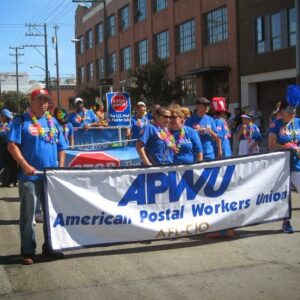January 16, 2019
Frequently Asked Questions
(This article first appeared in the January/February 2019 issue of the American Postal Worker magazine)
With negotiations for a new collective bargaining agreement between the USPS and the APWU now at an impasse, we are heading into interest arbitration. Below are answers to a few frequently asked questions the union has received regarding the next steps in achieving a new union contract.
Are we still working under a contract?
Yes. The terms of the 2015 to 2018 collective bargaining agreement (CBA or contract) continue until a successor contract is in place. This includes the no lay-off protections for those career employees with six years of employment.
The MOU “Re: Retail” with a moratorium of any expansion of CPUs, VPOs and Approved Shipper programs (p. 337 of the CBA) and the MOU providing lay-off protection for the life of the contract for career employees who had not yet reached their six years of employment (p. 274 of the CBA) have both ended due to their specified expiration date.
What is the difference between Interest Arbitration and Rights (Grievance) Arbitration?
Grievance/Rights Arbitration involves existing rights of employees under the current contract. The terms of the contract already exist. The rights arbitrator decides the proper application of the contract to the circumstances in question, with no authority to change any of the terms of the collective bargaining agreement.
By contrast the interest arbitrator, or panel of arbitrators, have the authority to write the terms of the collective bargaining agreement. An Employer and Union turn to an arbitrator, or panel of arbitrators, to resolve the differences between what each party wants included in the contract – if they do not voluntarily reach an agreement. In doing so, the interest arbitrator considers the interest each party has in establishing or changing terms in the collective bargaining agreement.
For example, suppose an employee worked twelve hours in a service day. The rights arbitrator could decide whether and how much penalty pay the employee was due under the terms of Article 8 of the CBA; but can’t change the terms of Article 8. By contrast an interest arbitrator could write new provisions for Article 8, which might change what employees get paid for hours
exceeding eight or ten in a day.
How long will this process take?
Other than the 1984 contract, the past interest arbitration decisions took about a year or more from the expiration of the contract.
What does the process involve?
Possible mediation
At this point either the APWU or USPS could elect to use mediation before proceeding to selection of an interest arbitrator. However, we can skip mediation.
Appointing an Interest Arbitration Panel
The APWU will select an advocate arbitrator, someone biased toward the union. The Postal Service will select an advocate arbitrator biased toward the Postal Service. The APWU and USPS will jointly select a neutral chair of this arbitration panel. This process will likely involve several exchanges of lists and alternate striking of names. The Federal Mediation and Conciliation Service (FMCS) may assist in providing names. When the neutral chair is picked, the chair will get an appointment letter from the director of FMCS.
Hearings
We will schedule hearing dates working around the schedules of the neutral chair, the party arbitrators, attorneys and witnesses. Previous interest arbitrations have used eighteen or more hearing dates spread out over several months. Several presentations are made to familiarize the neutral chair with the law and legislative history concerning bargaining and postal employment policies, the history of bargaining and previous interest arbitrations, postal operations, the work encompassed within the APWU bargaining unit. Employees testify about their work. Experts testify about wages, benefits, job comparisons, survey data. Subject matter experts testify about working conditions and work rules. Witnesses are subject to cross examination. APWU can rebut any information presented by the Postal Service, and the Postal Service has the right of rebuttal.
Executive Session
After the hearings and any written briefs, the panel of arbitrators go into executive session to determine the terms for the contract. While the neutral is obviously in control and making the final decisions, the party arbitrators can continue to argue about what should be changed and how any change should be worded. In some cases, the lawyers or lead negotiators might participate in these deliberations.
Continuing Negotiations
Before moving toward interest arbitration APWU and USPS extended negotiations four times through Dec. 21, 2018. Further extensions appeared to the APWU and to the USPS to simply delay the obvious need to move into the interest arbitration process. However, there is no prohibition against continuing discussions. In fact, the APWU has had several discussions with management since December 21.
The interest arbitration process provides ample opportunity for continuing discussions as we narrow and focus the issues to be presented to the arbitrators.
Does this mean there will not be a tentative agreement the members can vote on?
Any interest arbitration decision is final and binding. Members don’t get to vote on it. It is one of the reasons that APWU works hard to reach voluntary agreements – so members get a say.
During this interest arbitration process, APWU and USPS continue to talk and are free to reach a voluntary agreement. If a voluntary agreement is reached, we will suspend the interest arbitration process; present the tentative agreement to the Rank and File Bargaining Advisory Committee; and then, if the committee votes to bring it to the members, to a ratification vote by members.
What can APWU members and Contract Action Teams do?
It is critical to continue building support for a fair contract. Opportunities for talks between APWU and the Postal Service continue. The united actions of the members convey and demonstrate worker concerns, whether around safety, harassment, short staffing, excessive hours, etc., during the interest arbitration hearings.
Keep up Union Gear days, talking with other members and non-members about the importance of our collective bargaining rights and the protections we receive under the contract, and participate in Town Hall Calls and other events around the interest arbitration. Together we will continue Fighting Today for a Better Tomorrow!



